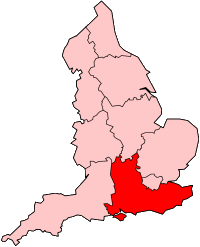Southampton District Energy Scheme
| Southampton District Energy Scheme | |
|---|---|
 | |
 | |
| Country | United Kingdom |
| Location | Southampton |
| Coordinates | 50°54′17″N 1°24′35″W / 50.904780°N 1.4096148°W |
| Status | Operational |
| Commission date | 1986 |
| Owner(s) | ENGIE |
| Geothermal power station | |
| Min. source temp. | 76 °C |
| Max. well depth | 1,800 m (5,900 ft) |
| External links | |
| Commons | Related media on Commons |
The Southampton District Energy Scheme is a district heating and cooling system in Southampton, United Kingdom. The system is owned and operated by ENGIE.
History
[edit]In the 1980s the Department of Energy undertook a research and development programme to examine the potential of geothermal aquifers in the UK. However, after some initial success drilling a well in the Wessex Basin in 1981, it was deemed too small to be commercially viable. The project was abandoned by the Department of Energy, but Southampton City Council took the decision to create the UK's first geothermal power scheme. This was undertaken as part of a plan to become a "self sustaining city" in energy generation, promoted by City Council officer Mike Smith and council leader Alan Whitehead.[1][2][3]
Pumping started in 1986 from the Wessex Basin aquifer at a depth of 1,800 m (5,900 ft) and a temperature of 76 °C (169 °F).[1][4] The system initially supplied only the Southampton Civic Centre, but was gradually expanded to serve over 1,000 residential properties,[1] as well as the WestQuay shopping centre, the Royal South Hants Hospital, Solent University and the Carnival offices; and is part of an enlarged city centre district heating system that includes other combined heating, cooling and power sources.
By 2007 the system had 11 km (6.8 miles) of pipes, and was producing 40 GWh of heat, 22 GWh of electricity and 8 GWh of cooling per year.[1]
By 2014 the system provided 7 MW CHP, 2 MW of geothermal power, and 1 MW from biomass, saving 12,000 tons CO2 per year.[5]
See also
[edit]References
[edit]- ^ a b c d "Case Study: Southampton". Greenpeace UK. Archived from the original on 11 October 2007. Retrieved 23 July 2007.
- ^ Ned Williams (30 November 2017). "Southampton's Geothermal Pursuit: A Success or Failure?". Wessex Scene. Southampton University Students Union. Archived from the original on 30 November 2017. Retrieved 29 February 2024.
- ^ Jon Gluyas; Andrew Crossland; Charlotte Adams (3 May 2019). "36bn GWh: the "limitless" Geothermal from old UK coal mines". Energy Post. Retrieved 29 February 2024.
- ^ Introduction to Geothermal Resource University of East Anglia
- ^ Geothermal District Heating Southampton case study

